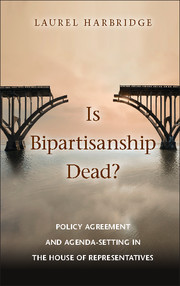Book contents
- Frontmatter
- Contents
- List of figures and tables
- Acknowledgments
- 1 Introduction
- 2 A Puzzle of Declining Bipartisanship
- 3 Strategic Partisan Agenda-Setting
- 4 Agenda-Setting and the Decline of Bipartisan Cooperation
- 5 Variation in Strategic Partisan Agenda-Setting
- 6 Strategic Partisan Agenda-Setting Across Policy Areas
- 7 District Responsiveness and Member-Party Relationships
- 8 The Past, Present, and Future of Bipartisanship
- Appendix
- References
- Index
5 - Variation in Strategic Partisan Agenda-Setting
Published online by Cambridge University Press: 05 March 2015
- Frontmatter
- Contents
- List of figures and tables
- Acknowledgments
- 1 Introduction
- 2 A Puzzle of Declining Bipartisanship
- 3 Strategic Partisan Agenda-Setting
- 4 Agenda-Setting and the Decline of Bipartisan Cooperation
- 5 Variation in Strategic Partisan Agenda-Setting
- 6 Strategic Partisan Agenda-Setting Across Policy Areas
- 7 District Responsiveness and Member-Party Relationships
- 8 The Past, Present, and Future of Bipartisanship
- Appendix
- References
- Index
Summary
In 1983, majority Democrats pursued bipartisan legislation to reform Social Security. H.R. 1900, which was sponsored by Dan Rostenkowski (D-IL) and cosponsored by one Democrat and one Republican, was based on recommendations from President Reagan’s bipartisan National Commission on Social Security Reform. This bill combined increases in the retirement age with delayed cost-of-living adjustments and increased payroll taxes. Not only was the cosponsorship of the bill bipartisan, but the vote to report the bill from the Ways and Means Committee had bipartisan support (32–2 vote), and the House final passage vote also had the support of a majority of both parties (282–148 vote, with Democrats splitting 185–79 and Republicans splitting 97–69).
Ten years later, this bipartisan atmosphere seemed to have been replaced. The majority Democrats not only passed major initiatives like education reform by partisan votes (“House Advances Education Reform Bill” 1993), but this partisan approach extended across many policies, including reform to a 121-year-old law that governed mining operations on federal lands. H.R. 322, which was sponsored by Nick Rahall II (D-WV) and cosponsored by 40 Democrats, 6 Republicans, and 1 Independent, instituted a royalty on extracted minerals, increased fees paid by miners for the land claims, and set up a regulatory regime aimed at protecting the environment from mining related-damage (Benenson 1993). Importantly, the mostly partisan Hardrock Mining Reform Act of 1993 (H.R. 322) was pursued in the House despite the presence of a more bipartisan bill addressing the same policy (H.R. 1708, sponsored by Bill Orton (D-UT) and cosponsored by 2 Republicans). Orton argued that the Rahall bill was supported by extreme environmental groups and would cripple the mining industry (Orton 1993). Despite the option of Orton’s more bipartisan bill, the Democratic majority pursued Rahall’s partisan bill, passing it in a party unity vote of 316–108 (with Democrats voting 245–6 and Republicans voting 70–102).
- Type
- Chapter
- Information
- Is Bipartisanship Dead?Policy Agreement and Agenda-Setting in the House of Representatives, pp. 84 - 114Publisher: Cambridge University PressPrint publication year: 2015

